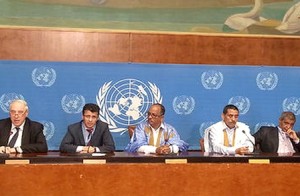 The case of two Sahrawi tradesmen who had been killed on January 5 by the Algerian army was brought before United Nations bodies in Geneva.
The case of two Sahrawi tradesmen who had been killed on January 5 by the Algerian army was brought before United Nations bodies in Geneva.
The coordination of the families of the two young Sahrawis cowardly shot dead in Oudiyat Toutrat locality, near the border with Mauritania, held a press conference last Friday at the UN headquarters in Geneva to draw the attention of the international community, particularly the High Commissioner for Human rights and the Human Rights Council (HRC) on the serious violations of human rights committed in the Tindouf camps.
As the Algerian authorities are keeping silent on the assassination, the coordination demands the opening of an impartial investigation and the prosecution of the instigators and perpetrators of the killing of Khatri Hammedha Khandoud and Mohamed Aliyenne Abbih. A third person, Moichan Salek Boujemaa, who was with the two victims at the moment of the shooting, has been seriously injured and is currently hospitalized in Morocco.
The victims’ families were represented at the press conference by Abdellah Salma and Yabba Sellami as well as by the lawyer Pierre Legros, former president of the Brussels Bar and President and founder of “Lawyers Without Borders.”
They insisted that all the truth about these crimes should be unveiled and described as “intolerable the continuing impunity for the horrible crimes” committed by the Polisario in collusion with the Algerian army and security services.
Abdellah Salma explained that “the bullet holes on the victims’ vehicles and the number of bullets shot at the victims show unequivocally that it was a premeditated murder.”
The victims’ families had refused to recover the corpses of their dear ones and demanded an autopsy and an investigation, but Algerian authorities, with the blessing of the Polisario, have secretly buried the bodies 45 days after the assassination, said the coordination.
The lawyer Pierre Legros has not ruled out the possibility to refer the case to an international criminal court. “If the Algerian government stifles the judicial procedure, it can be brought before national and international jurisdictions,” he said